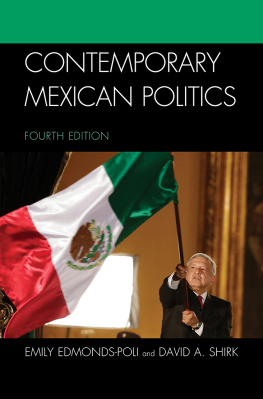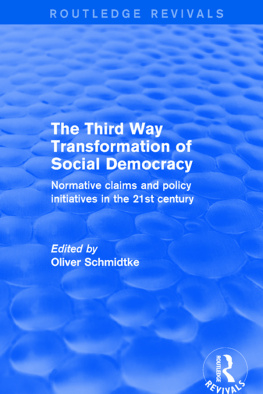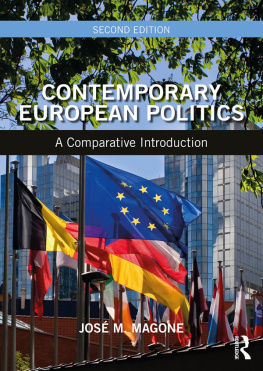Contemporary
Mexican Politics
Fourth Edition
Emily Edmonds-Poli
University of San Diego
David A. Shirk
University of San Diego
ROWMAN & LITTLEFIELD
Lanham Boulder New York London
Executive Editor: Susan McEachern
Assistant Editor: Katelyn Turner
Higher Education Channel Manager: Jonathan Raeder
Credits and acknowledgments for material borrowed from other sources, and reproduced with permission, appear on the appropriate pages within the text.
Published by Rowman & Littlefield
An imprint of The Rowman & Littlefield Publishing Group, Inc.
4501 Forbes Boulevard, Suite 200, Lanham, Maryland 20706
www.rowman.com
6 Tinworth Street, London SE11 5AL, United Kingdom
Copyright 2020 by The Rowman & Littlefield Publishing Group, Inc.
First Edition 2009. Second Edition 2012. Third Edition 2016.
All rights reserved. No part of this book may be reproduced in any form or by any electronic or mechanical means, including information storage and retrieval systems, without written permission from the publisher, except by a reviewer who may quote passages in a review.
British Library Cataloguing in Publication Information Available
Library of Congress Cataloging-in-Publication Data
Names: Edmonds-Poli, Emily, 1970 author. | Shirk, David A., 1971 author.
Title: Contemporary Mexican politics / Emily Edmonds-Poli, University of San Diego, David A. Shirk, University of San Diego.
Description: Fourth edition. | Lanham: Rowman & Littlefield, [2020] | Includes bibliographical references and index.
Identifiers: LCCN 2019057131 (print) | LCCN 2019057132 (ebook) | ISBN 9781538121917 (cloth) | ISBN 9781538121924 (hardback) | ISBN 9781538121931 (epub)
Subjects: LCSH: MexicoPolitics and government2000-Classification: LCC F1236.7 .E36 2020 (print) | LCC F1236.7 (ebook) | DDC 02.972/000905dc23
LC record available at https://lccn.loc.gov/2019057131
LC ebook record available at https://lccn.loc.gov/2019057132
 The paper used in this publication meets the minimum requirements of American National Standard for Information SciencesPermanence of Paper for Printed Library Materials, ANSI/NISO Z39.481992.
The paper used in this publication meets the minimum requirements of American National Standard for Information SciencesPermanence of Paper for Printed Library Materials, ANSI/NISO Z39.481992.
This book is dedicated to our many friends, mentors, and colleagues who have informed our understanding of Mexico and U.S.-Mexico relations.
Contents
Illustrations
Figures
Tables
Textboxes
Preface
T he 2018 elections marked the beginning of a new era in Mexico. After twelve years of PAN rule and the PRIs brief return to the presidency, MORENA, the newest party on the electoral scene, swept to power in an impressive electoral showing for any party, let alone one with just three years of experience. Led by its founder, Andrs Manuel Lpez Obrador, MORENA is a left-of-center party whose platform focuses on redistributing income and resources to the countrys poor and marginalized. Lpez Obrador (known familiarly by his initials, AMLO), used his extensive experience and charisma to successfully appeal not only to his loyal followers but also to Mexicans eager for change in the wake of increased violent crime, sluggish economic growth, and multiple corruption scandals under Enrique Pea Nieto.
From the outset of the campaign, AMLO was the frontrunner both because of his genuine popularity and the weakness of the competition. After a bruising internal fight that left lasting wounds, the PAN nominated Ricardo Anaya, a crafty political operator with relatively little name recognition at the national level. Meanwhile, the PRI, widely discredited as a result of Pea Nietos corruption scandals and perceived capitulation to U.S. President Donald Trump, was forced to look outside itself and nominate a nonpartisan bureaucrat in Jos Antonio Meade. Despite his extensive experience as a cabinet minister in two different administrations, Meade was not an effective campaigner and proved unable to convince Mexican voters that he and the PRI deserved the presidency.
While Lpez Obrador was consistently favored to win the presidential election, MORENAs overall performance exceeded expectations: in addition to winning the presidency by nearly thirty points, its coalition won majorities in both the Senate and the Chamber of Deputies, as well as majorities in Mexico City and two-thirds of the countrys thirty-one state legislatures. These results left little doubt that Mexicans had given AMLO a mandate. Indicative of his ambition for change, Lpez Obrador proclaimed that his administration would bring about Mexicos Fourth Transformation, on the scale of three previous major transformations (independence in 1821, the period of reform in the 1850s, and the 1910 revolution). He promised to root out corruption by unseating the elite power mafia, eliminate wasteful spending, and restructure the economy to benefit the roughly 50 percent of Mexicans who live in or close to poverty.
After a year in office, Lpez Obrador has consistently maintained approval ratings in the low sixties, suggesting that nearly two-thirds of Mexicans are so far satisfied with his performance. Optimists point to AMLOs efforts to investigate and punish high-profile politicians and bureaucrats suspected of corruption and abuse of power, as well as his daily press briefings as evidence of his commitment to bring transparency and accountability to politics. They are also pleased by his Republican Austerity initiative that led him to sell off the presidential airplane, slash the salaries of top government officials (including Supreme Court Justices), and eliminate bureaucratic positions in an effort to free up public money for other purposes. But most of all, poor and disadvantaged Mexicans seem to support the administrations policy initiatives that provide direct cash payments, education scholarships, and professional training programs to those who struggle to make ends meet. For many, AMLO is the first president to take the plight of the poor seriously and implement concrete measures to ameliorate their suffering, so their loyalty is well earned.
Yet for all of the support that Lpez Obrador enjoys, he is not immune from criticism. In addition to finding fault with the aforementioned initiatives, his detractors argue that his policies pose a danger to Mexicos macroeconomic stability by threatening foreign investment and discouraging private domestic initiatives. They point to the downgrading of Mexicos international credit and bond ratings following AMLOs decision to cancel the construction of Mexico Citys new airport and his efforts to curtail foreign investment in PEMEX and the energy sector as evidence that his economic policies will undermine Mexicos ability to attract the foreign investment it needs to remain productive and globally competitive. Others are more concerned with AMLOs apparent efforts to centralize power in the hands of the executive. His selective use of referenda (consulta popular) in MORENA strongholds to decide matters of national importance (e.g., the fate of Mexico Citys airport), and the creation of super delegates (superdelegados), to represent the federal government at the state level, threaten to undermine existing democratic institutions and disenfranchise critics.
But to many what is perhaps most worrisome in the short term is Lpez Obradors lack of a comprehensive plan to combat drug trafficking and organized crime, which together are largely responsible for the homicide rates that make Mexico comparable to an official war zone. Initially, Mexicans were willing to take a wait-and-see attitude to his approach that called for hugs, not bullets (










 The paper used in this publication meets the minimum requirements of American National Standard for Information SciencesPermanence of Paper for Printed Library Materials, ANSI/NISO Z39.481992.
The paper used in this publication meets the minimum requirements of American National Standard for Information SciencesPermanence of Paper for Printed Library Materials, ANSI/NISO Z39.481992.